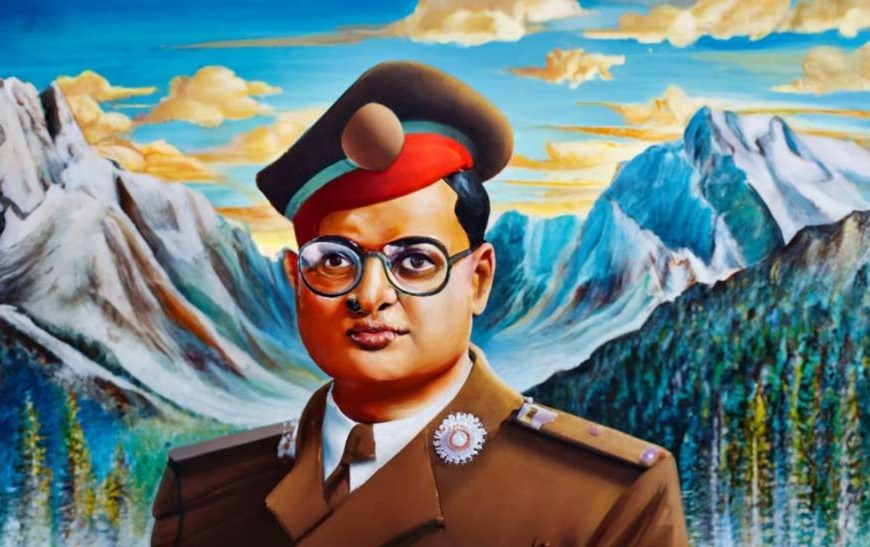Subhash Chandra Bose Jayanti, observed annually on January 23, marks the birth anniversary of one of India’s most respected freedom fighters, Subhas Chandra Bose. The day is also celebrated as ‘Parakram Diwas,’ honouring his relentless bravery and determination in India’s struggle for independence. From leading the Indian National Army to building strategic alliances during World War II, Netaji has played a crucial role in shaping the foundation of modern India. This article delves into the history and significance of Subhash Chandra Bose Jayanti.
Subhas Chandra Bose’s Birth Date and Early Life
Subhas Chandra Bose was born in Cuttack, Odisha, on January 23, 1897. His family was strongly oriented towards patriotism. In 1920, Subhas Chandra Bose appeared for the Indian Civil Service Competitive Exam and acquired 4th rank. However, he chose not to enter public service, believing nationalism to be a higher calling. He was greatly influenced by Swami Vivekananda’s teaching and was known for his patriotic zeal.
Here are some important details about Netaji’s childhood:
- Parents: Prabhavati Devi (Mother) and Janakinath Bose (Father)
- Spouse: Emily Schenkl
- Children: Anita Bose Pfaff
- Schooling & Education: Ravenshaw Collegiate School (Cuttack), Presidency College (Calcutta), and University of Cambridge (England).
- Associations: Indian National Congress, Indian National Army, Forward Bloc.Movements: Indian Freedom Movement
Interesting Facts About the Contribution of Subhas Chandra Bose in Indian Independence
Netaji Subhas Chandra Bose founded the ‘Azad Hind Fauj,’ frequently called the Indian National Army (INA). Besides that, Bose is remembered for his iconic slogan, “Tum Mujhe Khoon Do, Main Tumhe Azadi Dunga” (Give me blood, and I will give you freedom). However, contribution of Subhas Chandra Bose to Indian Independence doesn’t end here.
- Participation in Key Movements
- The Inception of the Forward Bloc
- International Alliances During World War II
- Setting Up Azad Hind Radio
- Contributions Beyond Politics
Netaji actively joined the Non-Cooperation Movement and the Civil Disobedience Movement, which were pivotal in India’s fight for freedom. His involvement showcased his determination to challenge British rule and bring independence to India.
In 1939, after leaving the Indian National Congress (INC), Bose formed the Forward Bloc. The Forward Bloc aimed to unite individuals who believed in a bold and direct approach to achieving independence.
Bose sought support from Axis powers such as Nazi Germany and Imperial Japan. He took advantage of the Axis power conflict with Britain to create an alliance and work toward getting India freed from British rule.
Azad Hind Radio was a radio service started by Netaji in 1942 in Germany while the Quit India Movement was in full swing in India. The radio service was initially operated in Germany. However, its headquarters was shifted to Singapore and later to Rangoon.
The primary purpose of this radio service was to encourage Indians to fight against British colonial rule. The station was broadcast in multiple languages, including Hindi, Bengali, Tamil, and Urdu, to reach a broad audience. It aimed to counter the propaganda of Allied radio stations and inspire Indian soldiers and civilians to join the independence movement.
Bose’s vision went beyond just political independence. He contributed to education and social reforms, advocating for a more inclusive and progressive India. For instance, Bose was instrumental in forming the Indian National Army (INA), which aimed to overthrow British rule in India through armed struggle. His leadership inspired many Indians to join the INA and fight for independence. Similarly, Netaji strongly supported industrialisation and state planning to make India self-sufficient and economically strong.
Overview of Subhash Chandra Bose Jayanti
Every year, Subhash Chandra Bose Jayanti is celebrated on January 23rd. On Subhash Chandra Bose Jayanti, various events are organised across the country, including seminars, cultural programs, and exhibitions. Schools, colleges, and government institutions often conduct special assemblies and discussions to educate the younger generation about Netaji’s life and contributions. Political leaders, scholars, and citizens alike participate in paying homage to this iconic figure. The public’s active participation reflects the enduring relevance of Bose’s ideals.
Frequently Asked Questions (FAQs) About Subhas Chandra Bose
- How Did Neta Ji Subhas Chandra Bose Died?
- When is Subhash Chandra Bose Jayanti celebrated?
- What was the Forward Bloc?
- What was Netaji’s famous slogan?
- How is Subhash Chandra Bose Jayanti observed in schools and colleges?
- How can individuals uphold Subhash Chandra Bose’s ideals today?
- How is Subhas Chandra Bose remembered in modern India?
- How can individuals participate in Subhash Chandra Bose Jayanti celebrations?
- What impact did Subhas Chandra Bose have on the Indian political landscape post-independence?
- Are there any monuments or memorials dedicated to Subhas Chandra Bose in India?
- How has Subhas Chandra Bose been portrayed in literature and cinema?
The controversy over Subhas Chandra Bose’s death persists due to the lack of conclusive evidence, conflicting accounts, and the absence of transparency in the investigations, leading to a range of theories and speculations surrounding this pivotal moment in Indian history.
Subhash Chandra Bose Jayanti is celebrated on January 23rd every year to mark his birth anniversary.
The Forward Bloc was a political group formed by Subhash Chandra Bose in 1939, advocating radical measures for India’s independence.
Netaji’s famous slogan was “Give me blood, and I shall give you freedom,” emphasising the sacrifice needed for India’s independence.
Educational institutions often conduct special assemblies, discussions, and programs to educate students about Netaji’s life and contributions.
Individuals can uphold Bose’s ideals by promoting unity, justice, and freedom, and actively participating in the betterment of the nation.
Bose is remembered through commemorations, events, and educational initiatives. His relevance persists through his impact on education, social reforms, and the enduring influence of his principles.
Individuals can participate in celebrations by attending events, seminars, and cultural programs organised on Subhash Chandra Bose Jayanti. Additionally, reflecting on his life and principles is a meaningful way to pay homage.
Subhash Chandra Bose’s impact persisted post-independence, influencing political thought and inspiring subsequent generations of leaders.
Yes, there are several monuments and memorials dedicated to Netaji, including the INA Memorial at Moirang, Manipur, and the Netaji Subhash Chandra Bose International Airport in Kolkata. Recently, Prime Minister Narendra Modi dedicated the statue of Netaji Subhas Chandra Bose to the nation near India Gate in New Delhi.
Bose’s life has been depicted in numerous books, documentaries, and films, including the acclaimed biopic “Netaji Subhas Chandra Bose: The Forgotten Hero” directed by Shyam Benegal.
Summing Up
In conclusion, Subhas Chandra Bose’s contribution to the Indian War of Independence will always be remembered in Indian history. In reflecting on Subhash Chandra Bose Jayanti, we find ourselves delving into the rich tapestry of India’s struggle for freedom, woven with the courage and sacrifice of leaders like Netaji. If your little one is interested in knowing more about Indian freedom fighters, visit our blog, Freedom Fighters Of India – Names And Their Contributions. You can also check EuroKids Blogs for more insightful and fun information about your child’s health, development, and well-being.
In the spirit of fostering courage, leadership, and a love for learning, EuroKids Preschools, a leading play school, stands as a beacon for the young minds of today. Our commitment to holistic education goes beyond textbooks, encouraging creativity, curiosity, and resilience in each child. Enrol your child at EuroKids Preschool, where education is not just a destination but a transformative voyage.
















